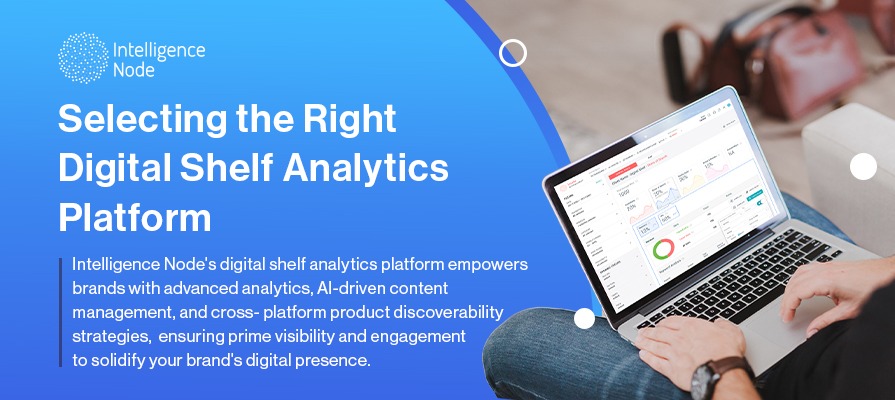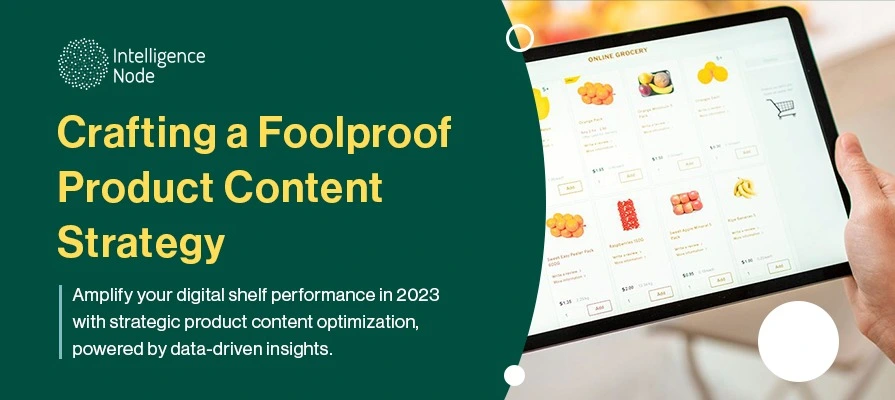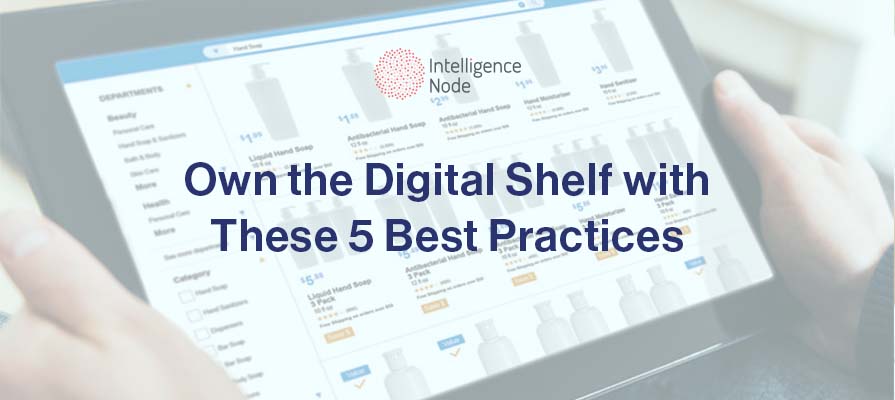In the dynamic world of online retail, the concept of the “digital shelf” has emerged as a pivotal battleground for brands vying for consumer attention & eCommerce success. The digital shelf refers to any virtual space where products are displayed online, encompassing search engine results pages (SERPs), digital marketplaces like Amazon and eBay, social media platforms, and brand websites.
In this fiercely competitive landscape, Intelligence Node’s digital shelf analytics platform stands out by empowering brands to not only navigate but also dominate the digital shelf through advanced analytics, AI-led content management, and cross-platform product discoverability strategies, ensuring your brand secures prime visibility and engagement in the digital world.
Key Features of Intelligence Node’s Digital Shelf Analytics Platform
Best-in-Industry Matching Accuracy: Achieve 99% data matching accuracy, ensuring reliable comparisons and confident decision-making.
Exact and Similar Product Matching: Track not only direct competitors but also similar variants and private labels, crucial for understanding your digital shelf share.
Real-Time Data at High Velocity: Refresh data across millions of products in as fast as every 5 seconds for immediate market insights.
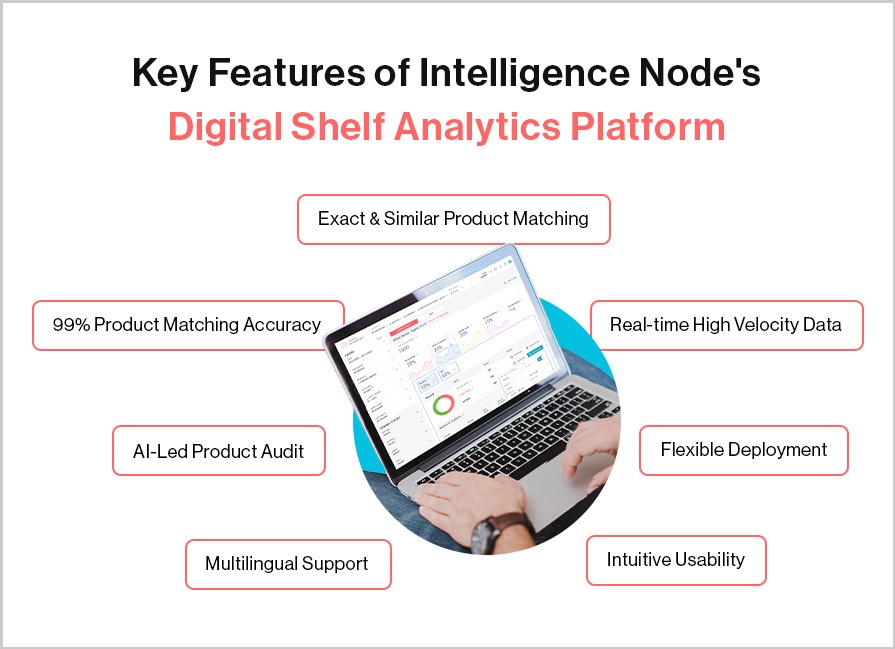
AI-Led Product Quality Audit: Utilize AI and ML algorithms, including computer vision, to thoroughly audit listing quality, images, and videos for an enhanced shopper experience.
Multilingual and Multi-Currency Support: Operate globally with support in 21 countries, 29 languages, and pricing in constant currency updated daily.
Flexible Deployment Options: Access data through a SaaS portal, API, or data feeds, tailored to your needs.
Intuitive Usability: Enjoy an easy-to-use interface accessible across various business functions, designed for simplicity and efficiency.
The Digital Shelf Dilemma: Why Top Shelf Placement Matters
This challenge is compounded by the fickleness of consumer loyalty; without compelling product imagery, detailed descriptions, persuasive reviews, and a user-friendly shopping experience, customers are quick to explore alternatives. In 2024, 57% of shoppers have expressed that insufficient product descriptions and imagery push them to abandon their carts and search for alternatives, impacting the ranking of product pages. This dynamic turns the digital shelf into a demanding environment where maintaining all these elements at peak performance is a relentless, time-consuming, resource-heavy task, particularly against the backdrop of constantly evolving parameters of success on search engine results pages (SERPs). For major brands worldwide, navigating these complexities presents a significant challenge in achieving top-page visibility.
How Brands Use Sponsored and Organic Google Searches for Peak Visibility
In pursuit of visibility on the digital shelf, brands employ two primary strategies to secure their rank on Search Engine Results Pages (SERPs): organic links and paid links. Organic links are those that appear naturally on the SERP based on the search engine’s algorithm, which determines relevance and authority without payment. In contrast, paid links, also known as sponsored results or Pay-Per-Click (PPC) ads, are prominently placed on the SERP because the advertiser has paid for their placement.
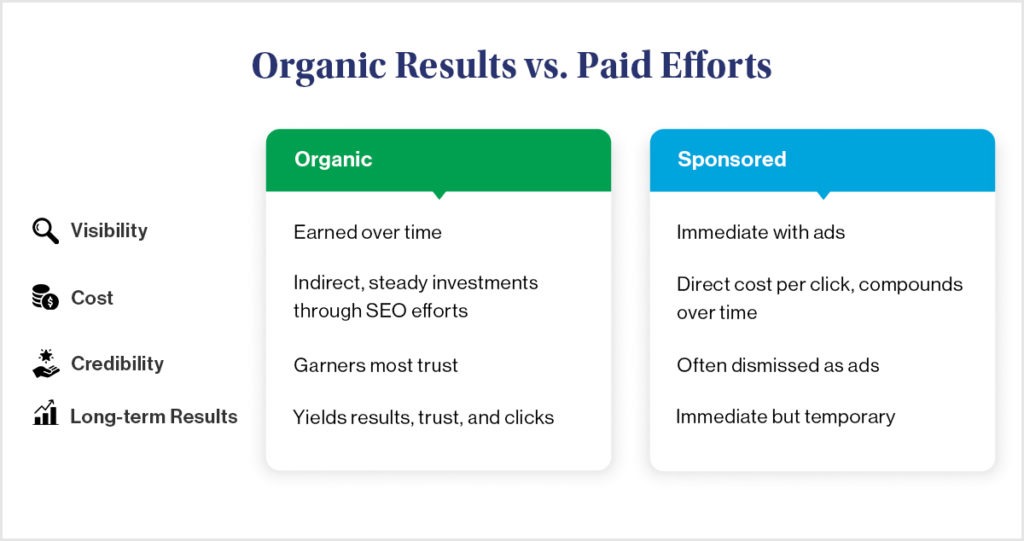
Paid Search Results: These function under a PPC model where advertisers bid on keywords relevant to their product or service. Setting up PPC campaigns involves selecting the right keywords, creating ad copy, setting a budget, and continuously monitoring and adjusting bids and strategies to optimize performance. This approach can quickly escalate in cost, especially for highly competitive keywords, requiring a significant budget and dedicated management to maintain visibility and drive traffic.
Organic Search Results: On the other hand, achieving a top ranking through organic search results requires a different set of strategies focused on enhancing the website’s SEO. This includes optimizing website content for relevant keywords, improving site structure and loading speed, acquiring backlinks from reputable sites, and providing a positive user experience with optimized product content and detailed imagery, descriptions, as well as reviews. Although climbing the ranks organically demands time, effort, and patience, it doesn’t directly incur the costs associated with PPC campaigns.
Intelligence Node’s digital shelf analytics platform specializes in enhancing your brand’s organic digital shelf presence by leveraging AI-driven insights and advanced analytics to optimize content, improve search share, and ensure your products are prominently displayed across multiple digital platforms, turning visibility into a key driver of success.
Intelligence Node’s Digital Shelf Analytics Software
An expertly optimized product display page stands out due to its detailed descriptions, accurate labeling, and keyword-optimized product content, making it easily recognizable by search engines and, as a result, enhancing its rankings and visibility. The manual process of achieving such optimization is both time-consuming and demanding, involving extensive keyword research, website modifications, and content adjustments, all of which require a significant investment of resources to stay competitive. Intelligence Node’s latest breakthrough tackles this challenge by combining proprietary AI, real-time data scraping, and generative AI. This innovative approach enables the real-time tracking and optimization of product display pages, offering automated AI-generated copy suggestions based on keywords and attributes of trending products. This technology allows brands to regain their competitive advantage in the digital marketplace, leading to higher SERP positions, increased traffic, and ultimately, more sales and profitability, all while reducing the resources, time, and expenses typically associated with manual optimization.
The key advantages of Intelligence Node’s digital shelf platform include-
1. Improving Product Searchability and Discoverability
Intelligence Node’s data-driven approach eliminates the guesswork in adapting to the ever-changing marketplace algorithms, offering insights into the strategies of top-performing brands and products. By distinguishing between paid and organic search results, measuring visibility on search engines and online marketplaces, and tracking best-selling and trending products across competitor platforms, brands can fine-tune their digital shelf share and visibility.
Additionally, understanding your share of search across categories, coupled with insights into winning strategies—whether organic or sponsored—empowers brands to improve their organic search results through PDP audit and recommendations. Establishing a consistent and trusted shopping experience across all platforms is crucial, as is leveraging Intelligence Node’s AI-driven tools to monitor trending keywords and optimize listings. Enhancing attributes, improving search filters, addressing product miscategorization, and refining product descriptions are key steps in closing the visibility gap.
2. Setting Competitive Prices and Streamlining Product Availability
Nearly 50% of consumers are now comparing products online even while browsing in physical stores. This heightened consumer awareness has made competitive pricing and product availability crucial factors in attracting customers and enhancing digital shelf presence. Intelligence Node’s proprietary product matching technology enables price comparison for similar and identical products worldwide, ensuring retailers can offer smart, optimized pricing that appeals to price-savvy consumers.
Moreover, Intelligence Node provides vital insights into inventory management, allowing brands to monitor stock levels nearly in real-time and track daily inventory movements—even on platforms like Amazon, which typically hides inventory information. This capability helps retailers avoid stockouts or excessive inventory of non-performing SKUs by analyzing day-to-day stock changes. Such insights are instrumental in forecasting sales, understanding market share, and adjusting inventory levels based on demand projections and competitor activities. Ensuring that best-selling products are always available and avoiding overstocking are key strategies in maximizing revenue and conversion rates in the competitive online retail landscape.
3. Auditing Product Descriptions & Imagery
A staggering 87% of consumers are less likely to make repeat purchases from retailers that offer inaccurate product information. Through the analysis of top-performing keywords and SKUs, the the digital shelf software identifies missing attributes, attribute nomenclature discrepancies, image issues, and inconsistencies, enabling the creation of enriched, keyword-driven product descriptions. This is achieved by leveraging visual transformers (ViT) and NLP algorithms to extract detailed descriptions from images and free text, further enhancing product attributes with accurate descriptions, images, and SEO-optimized keywords. The audit of Product Description Page (PDP) content is streamlined with Intelligence Node’s advanced analytics platform, simplifying the process of auditing and rectifying PDP content for improved discovery and search rankings. Utilizing next-gen generative AI, Intelligence Node’s copy optimization platform, powered by an internal database of over 3 billion SKUs, generates highly-accurate humanlike product description content that aligns with market trends and SEO keyword requirements.
4. Analyzing Customer Reviews & Shopper Sentiment
82% of shoppers actively seek out negative reviews to inform their choices. Verified reviews serve not only as crucial indicators of consumer sentiment but also significantly influence a product’s visibility and ranking on the digital shelf. Intelligence Node’s digital shelf software emphasizes the importance of identifying and resolving customer pain points to enhance satisfaction post-purchase.
The ‘Reviews and Ratings’ module delivers an in-depth analysis, facilitating the replication of successful product attributes and pinpointing areas needing improvement, ultimately enriching the product line and elevating the customer experience.
This dashboard enables brands to conduct a detailed analysis of feedback, offering insights into category, brand, or competitor-specific trends and strategies, thus empowering retailers to refine their review management processes. The platform’s ability to identify ‘Trending Words’ from reviews provides invaluable insights into consumer attitudes toward brands and products. By integrating these keywords into product descriptions, companies can more effectively meet customer expectations and capitalize on prevailing trends.
5. Optimizing Retail Media Spends
Prioritizing retail media spending enables brands to decide which results to sponsor and which to organically boost, based on the analysis of trending keywords and the commonalities among products dominating the share of search. Implementing these findings across your product portfolio and diligently monitoring, managing, and optimizing content to align with brand standards completes the holistic approach to securing a competitive edge in the digital marketplace. Furthermore, the platform aids in strategic decision-making regarding product prioritization and retail media investment. By analyzing keywords that resonate with consumers across reviews, marketplaces, and search engines, brands can optimize their content, ensuring it not only reflects positive feedback but also adheres to brand standards. This strategic approach to content management enhances a brand’s digital reputation and also guides retail media spending, highlighting opportunities for sponsored visibility versus organic improvement.
Digital Software Tech Stack:
MongoDB: This robust NoSQL database serves as the backbone for storing intricate product details, ensuring fast retrieval and seamless scalability.
LLM: Leveraging the capabilities of the Large Language Model (LLM), the OpenAI integration plays a pivotal role in understanding and analyzing the structured product data to optimize copy in real-time.
RAG Pipeline: Marking a first in the industry, the Real-time Retrieval-Augmented Generation (RAG) pipeline combines the retrieval of relevant information and generative processes to refine and enhance product descriptions dynamically.
Sherlock AI: As an integral part of the stack, Sherlock AI aids in advanced data analytics and ensures more contextually aware interpretations of the attribute rules and patterns.
How it Works

Intelligence Node’s advanced real-time digital shelf software and AI Content Optimization platform integrates generative AI’s cutting-edge, real-time prompt tuning capabilities with the power of our proprietary machine learning ‘Sherlock AI’ tool. (Sherlock AI is a cutting-edge, proprietary algorithm constructed on Go and Python, proficient in searching for matches from numerous web sources and Intelligence Node’s internal database, covering platforms like Google reverse image search and website search bars..)
To learn more about how to effectively leverage next-gen digital shelf software solutions for your business, book a demo with Intelligence Node today.
What sets our approach apart is our unparalleled database of over 3 billion retail SKUs across categories. By leveraging this vast data on top of the GPT layer, our solution ensures the generation of tailored product names and descriptions that are not just generic outputs but are finely tuned to resonate with current market trends. Additionally, this tool is equipped with an AI chat assistant and custom rubrics for optimal copy generation, allowing for immediate review and suggesting impactful alternatives.
With the added advantage of our unique real-time data scraping technology, the solution can automatically enact changes to live product display pages, ensuring real-time accuracy with minimal manual intervention. Finally, our solution integrates end-to-end with leading eCommerce platforms like Mirakl as well as into PIM/CMS systems via APIs; to enable true product copy optimization and real-time autocorrecting of product copy errors as opposed to the market standard of a simple product copy audit and reporting.
These capabilities empower brands to devise a long-term strategy focused on optimizing digital shelf performance across three key areas: traffic, product copy, and conversion. This strategy equips merchandising, eCommerce operations, and marketing teams with a cohesive data source, streamlining their efforts towards achieving shared goals. With Intelligence Node’s multilingual support, global reach, and cross-retail expertise, international brands can confidently compete, assuring their customers of a premier digital experience.

The Role of Generative AI in Intelligence Node’s Retail Analytics
Artificial Intelligence (AI), Machine Learning (ML), and Generative AI are revolutionizing the way businesses operate and interact with customers. This advanced retail technology can help brands optimize supply chain logistics, reducing costs and improving delivery times. By forecasting demand more accurately, retailers can minimize overstock and stockouts, enhancing profitability. Moreover, AI-driven analytics help retailers refine their marketing strategies, targeting consumers with personalized offers that significantly increase the likelihood of conversion.
Today, Generative AI helps brands and marketplaces optimize and strengthen product content to achieve top-shelf visibility with a fraction of the resources and time to consistently stay ahead of competition. In the digital era, AI, ML, and Generative AI are indispensable tools in the retail sector, driving innovation, efficiency, and customer-centricity in an increasingly competitive marketplace.
To gain a deeper understanding of our digital shelf solution, please feel free to contact us.
